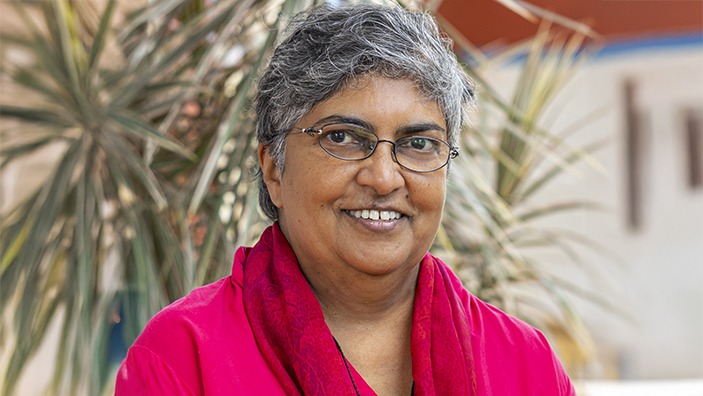KPMG Professor of Management Studies
BA (Bombay University), MA (Tata Institute of Social Sciences), PhD (The University of Texas at Austin)
My research interests include nonstandard work arrangements and how they affect individuals and organisations, and how dissimilarity in a team affects both the team and the organisation. More recently I have been exploring the longer terms implications of both nonstandard work and dissimilarity for individual and organisational effectiveness.
My work has appeared in academic journals like the Academy of Management Journal, Academy of Management Review, Administrative Science Quarterly, Organization Science, and the Journal of Applied Psychology.

Professional experience
Professor George is the Editor-in-Chief of the Academy of Management Annals. She has previously served as Editor of Organizational Psychology Review, Associate Editor of Academy of Management Annals and Organizational Psychology Review, Area Editor of the Australian Journal of Management, and Senior Editor of Organization Studies. She is a member of the editorial boards of Academy of Management Journal, Academy of Management Discovery, Academy of Management Review, Australian Journal of Management, Journal of Organizational Behavior, Human Relations, and Vikalpa. She has worked as a consultant at the Tata Management Training Centre, and Price Waterhouse.
Previous appointments
Professor George was a professor at the University of Auckland Business School prior to joining Cambridge Judge Business School. She has also held academic appointments at Hong Kong University of Science and Technology, University of New South Wales, University of Queensland and Western Michigan University.
Publications
Selected publications
- Cronin, M.A. and George, E. (2023) “The why and how of the integrative review.” Organizational Research Methods, 26(1): 168-192 (DOI: 10.1177/1094428120935507)
- Avery, D.R., Brown, D.K., Dumas, T.L., George, E., Joshi, A., Loyd, D.L., van Knippenberg, D., Wang, M. and Xu, H. (in alphabetical order) (2022) “Racial biases in the publication process: exploring expressions and solutions.” Journal of Management, 48(1): 7-16 (DOI: 10.1177/01492063211030561)
- Chattopadhyay, P., George, E., Li, J. and Gupta, V. (2020) “Geographical dissimilarity and team member influence: do emotions experienced in the initial team meeting matter?” Academy of Management Journal, 63(6): 1807-1839 (DOI: 10.5465/amj.2017.0744)
- Zhang, L.L., George, E. and Chattopadhyay, P. (2020) “Not in my pay grade: the relational benefit of pay grade dissimilarity.” Academy of Management Journal, 63(3): 779-801 (DOI: 10.5465/amj.2016.1344)
- Li, J., Li, A., Chattopadhyay, P., George, E., Gupta, V. and Marcus, D.K. (2018) “Team emotion diversity and performance: the moderating role of social class homogeneity.” Group Dynamics: Theory, Research, and Practice, 22(2): 76-92 (DOI: 10.1037/gdn0000083)
- Chattopadhyay, P., George, E. and Ng, C.K. (in alphabetical order) (2016) “Hearts and minds: integrating regulatory focus and relational demography to explain responses to dissimilarity.” Organizational Psychology Review, 6(2): 119-144 (DOI: 10.1177/2041386615574540)
Journal articles
- Cronin, M.A. and George, E. (2023) “The why and how of the integrative review.” Organizational Research Methods, 26(1): 168-192 (DOI: 10.1177/1094428120935507)
- Avery, D.R., Brown, D.K., Dumas, T.L., George, E., Joshi, A., Loyd, D.L., van Knippenberg, D., Wang, M. and Xu, H. (in alphabetical order) (2022) “Racial biases in the publication process: exploring expressions and solutions.” Journal of Management, 48(1): 7-16 (DOI: 10.1177/01492063211030561)
- Chattopadhyay, P., George, E., Li, J. and Gupta, V. (2020) “Geographical dissimilarity and team member influence: do emotions experienced in the initial team meeting matter?” Academy of Management Journal, 63(6): 1807-1839 (DOI: 10.5465/amj.2017.0744)
- Zhang, L.L., George, E. and Chattopadhyay, P. (2020) “Not in my pay grade: the relational benefit of pay grade dissimilarity.” Academy of Management Journal, 63(3): 779-801 (DOI: 10.5465/amj.2016.1344)
- Li, J., Li, A., Chattopadhyay, P., George, E., Gupta, V. and Marcus, D.K. (2018) “Team emotion diversity and performance: the moderating role of social class homogeneity.” Group Dynamics: Theory, Research, and Practice, 22(2): 76-92 (DOI: 10.1037/gdn0000083)
- Chattopadhyay, P., George, E. and Ng, C.K. (in alphabetical order) (2016) “Hearts and minds: integrating regulatory focus and relational demography to explain responses to dissimilarity.” Organizational Psychology Review, 6(2): 119-144 (DOI: 10.1177/2041386615574540)
- George, E., Chattopadhyay, P. and Ng, C.K. (2016) “The relationship between workgroup blending and perceived organizational inducements: the mediating roles of tasks and relationships.” Australian Journal of Management, 41(3): 538-562 (DOI: 10.1177/0312896215595680)
- George, E., Chattopadhyay P. and Zhang, L.L. (2012) “Helping hand or competition? The moderating influence of perceived upward mobility on the relationship between blended workgroups and employee attitudes and behaviors.” Organization Science, 23(2): 355-372 (DOI: 10.1287/orsc.1100.0606)
- George, E., Levenson, A., Finegold, D. and Chattopadhyay, P. (2010) “Extra-role behaviors among temporary workers: how firms create relational wealth in the United States of America.” International Journal of Human Resource Management, 21(4): 530-550 (DOI: 10.1080/09585191003612034)
- Chattopadhyay, P., George, E. and Shulman, A.D. (2008) “The asymmetrical influence of sex dissimilarity in distributive vs. colocated work groups.” Organization Science, 19(4): 581-593 (DOI: 10.1287/orsc.1070.0324)
- Ashford, S.J., George, E. and Blatt, R. (2007) “Old assumptions, new work: the opportunities and challenges of research on nonstandard employment.” Academy of Management Annals, 1(1): 65-117 (DOI: 10.5465/078559807)
- George, E., Chattopadhyay, P., Sitkin, S.B. and Barden, J. (2006) “Cognitive underpinnings of institutional persistence and change: a framing perspective.” Academy of Management Review, 31(2): 347-365 (DOI: 10.5465/AMR.2006.20208685)
- George, E. and Chattopadhyay, P. (2005) “One foot in each camp: the dual identification of contract workers.” Administrative Science Quarterly, 50(1): 68-99 (DOI: 10.2189/asqu.2005.50.1.68)
- Sitkin, S.B. and George, E. (2005) “Managerial trust-building through the use of legitimating formal and informal control mechanisms.” International Sociology, 20(3): 307-338 (DOI: 10.1177/0268580905055479)
- Chattopadhyay, P., George, E. and Lawrence, S.A. (2004) “Why does dissimilarity matter? Exploring self-categorization, self-enhancement, and uncertainty reduction.” Journal of Applied Psychology, 89(5): 892-900 (DOI: 10.1037/0021-9010.89.5.892)
- Chattopadhyay, P., Tluchowska, M. and George, E. (2004) “Identifying the ingroup: a closer look at the influence of demographic dissimilarity on employee social identity.” Academy of Management Review, 29(2): 180-202 (DOI: 10.2307/20159028)
- Davis-Blake, A., Broschak, J. and George, E. (2003) “Happy together? How using nonstandard workers affects exit, voice, and loyalty among standard employees.” Academy of Management Journal, 46(4): 475-485 (DOI: 10.5465/30040639)
- George, E. (2003) “External solutions and internal problems: the effects of employment externalization on internal workers’ attitudes.” Organization Science, 14(4): 386-402 (DOI: 10.1287/orsc.14.4.386.17488)
- George, E. and Chattopadhyay, P. (2002) “Do differences matter? Understanding demography-related effects in organisations.” Australian Journal of Management, 27(2): 47-55
- Chattopadhyay, P. and George, E. (2001) “Examining the effects of work externalization through the lens of social identity theory.” Journal of Applied Psychology, 86(4): 781-788 (DOI: 10.1037/0021-9010.86.4.781)
- Deshpande, S.P., George, E. and Joseph, J. (2000) “Ethical climates and managerial success in Russian organizations.” Journal of Business Ethics, 23(2): 211-217 (DOI: 10.1023/A:1005943017693)
- Dukerich, J.M., Waller, M.J., George, E. and Huber, G.P. (2000) “Moral intensity and managerial problem solving.” Journal of Business Ethics, 24(1): 29-38 (DOI: 10.1023/A:1006030109047)
- George, E., Milman, C. and Deshpande, S. (1999) “A comparison of ethical practices of Russian and American managers.” International Journal of Value-Based Management, 12(2): 129-136
- Beyer, J.M., Chattopadhyay, P., George, E., Glick, W.H., ogilvie, d.t. and Pugliese, D. (1997) “The selective perception of managers revisited.” Academy of Management Journal, 40(3): 716-737 (DOI: 10.5465/257060)
Books, monographs, reports and case studies
George, E. and Chattopadhyay, P. (2017) Understanding nonstandard work arrangements: using research to inform practice. Society for Human Resource Management and Society for Industrial and Organizational Psychology.
George, E. and Chattopadhya, P. (2015) Non-standard work and workers: organizational implications. Geneva: International Labour Office.
Book chapters
- Chattopadhyay, P., George, E. and Ng, C.K. (2011) “An uncertainty reduction model of relational demography.” In: Joshi, A., Liao, H. and Martocchio, J.J. (eds.) Research in personnel and human resources management (Research in Personnel and Human Resources Management, vol.30). Bingley: Emerald, pp.219-251 (DOI: 10.1108/S0742-7301(2011)0000030007)
- George, E. and Ng, C.K. (2011) “Nonstandard workers: work arrangements and outcomes.” In: Zedeck, S. (ed.) APA handbook of industrial and organizational psychology, vol.1: building and developing the organization. Washington, DC: American Psychological Association (DOI: 10.1037/12169-018)
- George, E. and Qian, C. (2010) “Organizational identity and control: can the two go together?” In: Sitkin, S.B., Cardinal, L.B. and Bijlsma-Frankema, K.M. (eds.) Organizational control. Cambridge: Cambridge University Press, pp.167-190 (DOI: 10.1017/CBO9780511777899.007)
- George, E. and Chattopadhyay, P. (2009) “Group composition and decision making.” In: Hodgkinson, G.P. and Starbuck, W.H. (eds.) Oxford handbook of organizational decision making. Oxford: Oxford University Press, pp.361-380 (DOI: 10.1093/oxfordhb/9780199290468.003.0019)
Awards and honours
- E Yetton Award for Best Paper Published in the Australian Journal of Management, 2016
- Best Paper Award, Academy of Management Review, 2006
News and insights
Equality, diversity and inclusion
3 ways diversity can impact team dynamics
Three recent studies by new Cambridge Judge faculty members Elizabeth George and Prithviraj Chattopadhyay look at how diversity in gender, geography and pay grade affect the modern workplace.
Professor George often focuses on issues surrounding nonstandard work, including how people adjust to new types of work such as temporary contracts and remote working.



